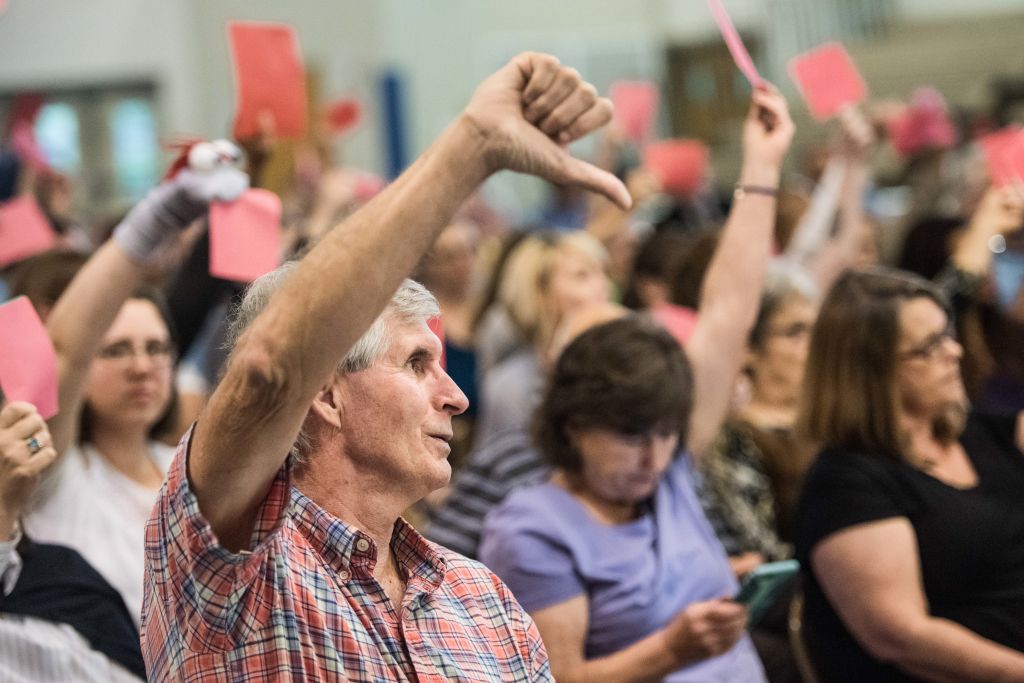Vulnerable Republicans are declining to hold town hall events during the long Easter recess


A free daily email with the biggest news stories of the day – and the best features from TheWeek.com
You are now subscribed
Your newsletter sign-up was successful
When Republicans held public meetings with their constituents in February, many of the House members and senators received an earful, so few House Republicans in competitive districts have planned town hall events over the current break, which lasts until April 23. Only two of 16 swing-district Republicans who voted for the GOP health-care bill in committee, for example, are directly facing their constituents over the break, USA Today reports, based on scheduled events compiled by TownHallProject.com. And at least one of those two Republicans, Rep. Ryan Costello (Pa.), screened his audience beforehand and forbade cameras from the event.
The restrictions imposed on town hall events like Costello's have prompted jeering from Democrats and constitutional challenges from the ACLU, but the refusal of most potentially vulnerable Republicans to hold any public meeting has drawn the ire of constituents and local newspapers. Liberal organizers have taken to scheduling town hall meetings and inviting the House members to attend, putting an empty chair on stage when the invitation is declined. Many Republicans are holding forums over the phone or Facebook Live.
If the unexpectedly close special elections in reliably red districts in Georgia and Kansas are any harbinger of the 2018 midterms, Republicans have some reason to be nervous. And congressional politics watchers say that after the Democrats' brutal town halls in the ObamaCare-fueled Tea Party era of 2009 and 2010, the GOP's reluctance to meet with voters face-to-face is understandable but short-sighted.
The Week
Escape your echo chamber. Get the facts behind the news, plus analysis from multiple perspectives.

Sign up for The Week's Free Newsletters
From our morning news briefing to a weekly Good News Newsletter, get the best of The Week delivered directly to your inbox.
From our morning news briefing to a weekly Good News Newsletter, get the best of The Week delivered directly to your inbox.
"If there's anything worse than being on the wrong side of a political issue it's appearing cowardly and not facing your constituents," Ross Baker, a Rutgers University political scientist, tells USA Today. "Politics is all about accountability," he added. "It's not an attractive quality in an elected official to be as nervous as a Christmas goose when you're dealing with your constituents." You can read more at USA Today.
A free daily email with the biggest news stories of the day – and the best features from TheWeek.com
Peter has worked as a news and culture writer and editor at The Week since the site's launch in 2008. He covers politics, world affairs, religion and cultural currents. His journalism career began as a copy editor at a financial newswire and has included editorial positions at The New York Times Magazine, Facts on File, and Oregon State University.
-
 5 calamitous cartoons about the Washington Post layoffs
5 calamitous cartoons about the Washington Post layoffsCartoons Artists take on a new chapter in journalism, democracy in darkness, and more
-
 Political cartoons for February 14
Political cartoons for February 14Cartoons Saturday's political cartoons include a Valentine's grift, Hillary on the hook, and more
-
 Tourangelle-style pork with prunes recipe
Tourangelle-style pork with prunes recipeThe Week Recommends This traditional, rustic dish is a French classic
-
 Judge blocks Hegseth from punishing Kelly over video
Judge blocks Hegseth from punishing Kelly over videoSpeed Read Defense Secretary Pete Hegseth pushed for the senator to be demoted over a video in which he reminds military officials they should refuse illegal orders
-
 Trump’s EPA kills legal basis for federal climate policy
Trump’s EPA kills legal basis for federal climate policySpeed Read The government’s authority to regulate several planet-warming pollutants has been repealed
-
 House votes to end Trump’s Canada tariffs
House votes to end Trump’s Canada tariffsSpeed Read Six Republicans joined with Democrats to repeal the president’s tariffs
-
 Bondi, Democrats clash over Epstein in hearing
Bondi, Democrats clash over Epstein in hearingSpeed Read Attorney General Pam Bondi ignored survivors of convicted sex offender Jeffrey Epstein and demanded that Democrats apologize to Trump
-
 El Paso airspace closure tied to FAA-Pentagon standoff
El Paso airspace closure tied to FAA-Pentagon standoffSpeed Read The closure in the Texas border city stemmed from disagreements between the Federal Aviation Administration and Pentagon officials over drone-related tests
-
 Judge blocks Trump suit for Michigan voter rolls
Judge blocks Trump suit for Michigan voter rollsSpeed Read A Trump-appointed federal judge rejected the administration’s demand for voters’ personal data
-
 US to send 200 troops to Nigeria to train army
US to send 200 troops to Nigeria to train armySpeed Read Trump has accused the West African government of failing to protect Christians from terrorist attacks
-
 Grand jury rejects charging 6 Democrats for ‘orders’ video
Grand jury rejects charging 6 Democrats for ‘orders’ videoSpeed Read The jury refused to indict Democratic lawmakers for a video in which they urged military members to resist illegal orders
